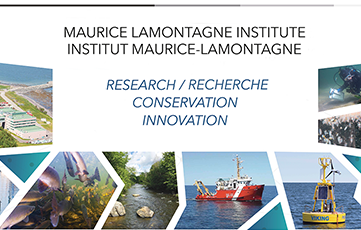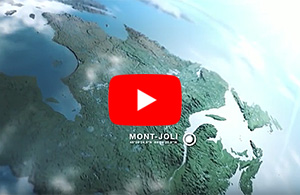Maurice Lamontagne Institute
Located in Mont-Joli, Quebec, on the shores of the St.Lawrence Estuary, the Maurice Lamontagne Institute (MLI) is part of a network of Fisheries and Oceans Canada (DFO) research centres. Inaugurated in 1987, it is one of the world’s major francophone marine sciences centres.
It employs some 300 people in two large sectors: ocean science and aquatic ecosystems management.
The mission of multidisciplinary teams is to provide the federal government with a thorough scientific basis for the conservation and sustainable management of marine resources and aquatic ecosystems, marine environment protection and safe navigation.
The main activity area covers the Estuary and Gulf of St.Lawrence, the Saguenay Fjord, Hudson Bay and Hudson Strait; some activities, aimed at the protection of fisheries and aquatic species at risk, cover Quebec’s freshwater ecosystems.
Expertise
The work of the scientific teams focuses on monitoring biodiversity and ecosystem status. These activities include research on aquatic invasive species, fish stocks and marine mammals, and ocean ecosystem dynamics. Work is also carried out on climate change and environmental stressors, the impact of human activity on the environment, and research on species at risk. Forecasting and monitoring of water levels, mapping and the use of web services in connection with hydrographic needs for navigation round out the areas of activity. The national Centre of Expertise on Marine Mammals is also located at the Institute and is staffed by DFO science personnel.
Every year, our teams document and assess the abundance of over 40 fish and invertebrate stocks, as well as provide advice on conservation and management of these important resources. They also monitor oceanographic conditions, documenting the impact of climate change and populating ocean models.
We also have teams working on aquatic ecosystems management by implementing both the Fisheries Act and the Species at Risk Act, in freshwater and in marine environments, and the Oceans Act for the protection of aquatic species and their habitat, the protection and recovery of aquatic species at risk, and the development of a network of marine protected areas in the Estuary and Gulf of St. Lawrence. By providing expert advice in DFO’s areas of responsibility, these teams also support the federal environmental assessment process under the Canadian Environmental Assessment Act.
The MLI’s teams also participate in several national and international North Atlantic research and monitoring networks.
Scientific facilities
The Maurice Lamontagne Institute covers an area of 25,000 square metres and has over 70 labs for research in biology, oceanography, hydroacoustics, physical sea condition modelling, and biochemical and ecosystemic modelling. It also has a genetic testing lab, a dissection room and rooms for hydrography, mapping and remote sensing work.
The tank room is a specialized wet lab measuring more than 2,000 square metres that can hold tanks of varying sizes as well as high-tech equipment. Salt water comes directly from the St.Lawrence. Experimental studies on the reproduction, physiology and behaviour of marine species and ecosystems are conducted in this lab. This system, one of the largest of its type in Canada, accommodates large-scale experimental studies, which is essential for conducting on-site testing, validation and controls of observed and monitored environmental conditions.

In addition, seven controlled-atmosphere units are available for research as part of smaller-scale experiments in various fields, including the acidification of marine waters.
The experimental basins and certain laboratories are fed freshwater or sea water (filtered or unfiltered) by gravity from reservoirs. Salt water comes directly from the St.Lawrence Estuary. This system, one of the most important in Canada, allows large-scale experimental studies in laboratories.
The Canadian Coast Guard operates a large vessel maintenance shop. Nearly 85 vessels and small craft undergo maintenance there annually. The Institute’s scientists have access to a fleet of Canadian Coast Guard vessels and helicopters. Two vessels are dedicated to scientific research in oceanography and fishery science.
Our scientists rely on four scuba diving teams made up of about twenty experienced divers with certified modern equipment for work in cold coastal areas (-2 to 20°C) at depths of up to 40 metres.
The research centre also houses the 250‑seat Estelle-Laberge auditorium and various meeting rooms.
Conferences
Scientific conferences of the Maurice Lamontagne Institute
REDFISH HORIZON
Exploring the depths of sustainable fishing and envisioning the future
March 21, 2024, Maurice Lamontagne Institute, Fisheries and Oceans Canada
Redfish Horizon brought together over 180 scientists to discuss Redfish, a fish that has been making a remarkable comeback in recent years. This was a unique opportunity to share the most up-to-date knowledge on Redfish stocks status and the scientific issues surrounding their return in the St. Lawrence.
This event is the result of the “Return of groundfish to the estuary and northern Gulf of St. Lawrence” project, carried out in collaboration with researchers from the Institut des sciences de la mer de Rimouski (UQAR), Université du Québec à Chicoutimi (UQAC), Université Laval, Université de Montréal and Fisheries and Oceans Canada (DFO). The work presented, resulting from our collaboration with Ressources Aquatiques Québec, enhances our understanding of Redfish ecology and their role in the Gulf of St. Lawrence.
Thanks to the Réseau Quebec Maritime for its contribution to this event, which brought together participants from academia, the provincial and federal governments and the fishing industry.
The entire workshop is available for replay. An English translation of the presentations is available by selecting "English" under the "Langue" tab at bottom right of screen.
Workshop program:
8:30 Welcome
Christine Desjardins - DFO and Céline Audet - UQAR
8:40 Status of redfish stocks
Caroline Senay - DFO
9:00 Population genomic structure
Geneviève Parent - DFO
9:20 Environmental control of growth
Lola Coussau, Maria Martinez-Silva and Joëlle Guitard - UQAR
9:55 Larval, juvenile and adult feeding, contaminant accumulation and human health risks
Dominique Robert, Sarah Brown-Vuillemin and Zhe Lu - UQAR
10:45 Environmental DNA analysis in the Gulf and Saguenay river
Martin Laporte - MELCCFP and Olivier Morissette - UQAR
11 h Connectivity and migrations estimated by otolith chemistry
Lola Coussau - UQAR and Pascal Sirois - UQAC
11:20 Recruitment determinism
Dominique Robert - UQAR
11:30 Changes in the ecological social system of fisheries
Étienne Quillet - UQAR
11:45 Current projects
David Deslauriers and Arthur Gandin - UQAR
Guided Tours

Guided tours of the Maurice Lamontagne Institute are back for the summer of 2025!
Come visit us and discover the richness of marine sciences!
The Maurice Lamontagne Institute is the only Fisheries and Oceans Canada's French-language marine science research center and one of the largest in the world.
The 60-minute tours take place Monday to Friday, from June 25 to August 22, 2025, between 9:00 a.m. and 3:00 p.m. They are offered free of charge, in French or English.
You will have privileged access to :
- The tank room
- Some laboratories
- The Canadian Coast Guard vessel maintenance shop
Learn more about the work of our scientists and the stimulating work environment that the Maurice Lamontagne Institute is.
Reservations
To make a reservation, call us at 418-775-0870 or email us with your name, phone number, number of person(s) and desired time of visit.
We are located at:
850, route de la Mer (route 132)
Mont-Joli, Quebec
By the sea, between Sainte-Flavie and Reford Gardens
To learn more about the Maurice Lamontagne Institute, click here or watch this video
How to Reach Us
Contact details
Fisheries and Oceans Canada
850, route de la Mer
P.O. Box 1000
Mont-Joli, Quebec G5H 3Z4
Telephone: 418-775-0500
Fax: 418-775-0730
Email: info@dfo-mpo.gc.ca
Media relations
Telephone: 418-648-5474
Email: media.qc@dfo-mpo.gc.ca
